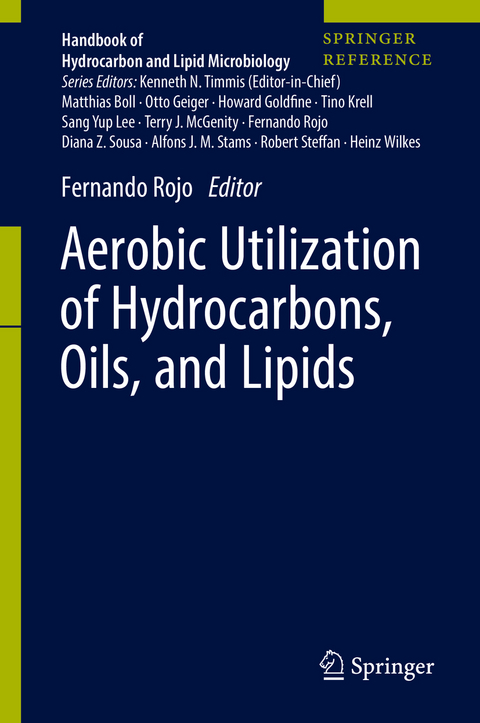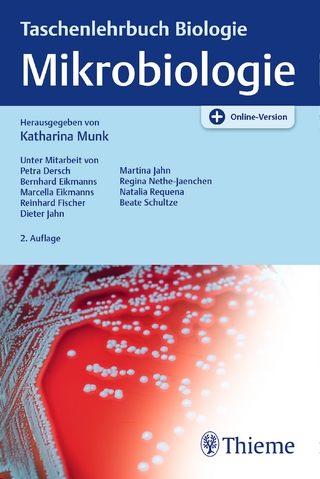
Aerobic Utilization of Hydrocarbons, Oils, and Lipids
Springer International Publishing (Verlag)
978-3-319-50417-9 (ISBN)
Fernando Rojo is Research Professor at the Spanish Research Council (CSIC), and leads a research group at the National Centre for Biotechnology (CNB-CSIC) in Madrid, Spain. His interests include the regulation of the expression of genes involved in the assimilation of hydrocarbons by bacteria, and the global regulation of metabolism in bacteria.
A Genomic View of the Catabolism of Aromatic Compounds in Pseudomonas.- A Genomic View of the Catabolism of Short Chain Alkanes.- Aerobic Degradation of Aromatic Hydrocarbons.- Aerobic Degradation of Aromatic Hydrocarbons: Enzyme Structures and Catalytic Mechanisms.- Aerobic Degradation of Chloroaromatics.- Aerobic Degradation of Gasoline Ether Oxygenates.- Aerobic Degradation of Halogenated Aliphatics.- Biochemistry and Molecular Biology of Methane Monooxygenase.- Biosynthesis, Insertion and Function of Fe-S Cofactors.- Biosynthesis, Insertion and Function of Flavin Cofactors.- Biosynthesis, Insertion and Function of haem-iron Prosthetic Groups.- Computational Framework for Integration of Lipidomics Data into Metabolic Pathways.- Degradation of Dimethylsulfoniopropionate (DMSP) and Dimethylsulfide (DMS).- Degradation of Rubber/Polyisoprene.- Diversity and Common Principles in Enzymatic Activation of Hydrocarbons: An Introduction.- Energetic and Other Quantitative Aspects of MicrobialHydrocarbon Utilization: An Introduction:.- Enzymes for Aerobic Degradation of Alkanes in Bacteria.- Enzymes for Aerobic Degradation of Alkanes in Yeasts.- Evolution of New Catabolic Functions Through Gene Assembly by Mobile Genetic Elements.- Experimental Evolution of Novel Regulatory Activities in Response to Hydrocarbons and Related Chemicals.- Functional Gene Diversity, Biogeography, Dynamics.- Genetic Features and Regulation of n-Alkane Metabolism in Bacteria.- Genetic Features and Regulation of n-Alkane Metabolism in Yeasts.- Genetic Features of Methylotrophs.- Genetics and Functional Genomics of Aerobic Degradation of Hydrocarbons: An Introduction.- Genetics and Molecular Features of Bacterial Dimethylsulfoniopropionate (DMSP) and Dimethylsulfide (DMS) Transformations.- Genetics of Biphenyl Biodegradation and Co-Metabolism of PCBs.- Genetics of Rubber/Polyisoprene Degradation.- Genetics and Ecology of Isoprene Degradation.- Genomic View of Mycobacterial High Molecular Weight Polycyclic Aromatic Hydrocarbon Degradation.- Global Aerobic Degradation of Hydrocarbons in Aquatic Systems.- Global Aerobic Degradation of Hydrocarbons in Terrestrial Systems.- Global Consequences of the Microbial Production and Consumption of Inorganic and Organic Sulfur Compounds.- Key Features of Aerobic Hydrocarbon Biodegrader Genomes.- Lipid Degradation - Lipid Cycles.- Lipolytic Enzymes from Bacteria.- Lipolytic Enzymes from Yeasts.- Metabolism of Steroids.- Oxidative Inactivation of Ring-Cleavage Extradiol Dioxygenases: Mechanism and Ferredoxin-Mediated Reactivation.- Pathways for the Degradation of Fatty Acids in Bacteria.- Phylogenomics of Aerobic Bacterial Degradation of Aromatics.- Physiology and Biochemistry of the Aerobic Methane Oxidizing Bacteria.- Potential for Microbial Interventions to Reduce Global Warming.- Rational Construction of Bacterial Strains with New/Improved Catabolic Capabilities for the Efficient Breakdown of Environmental Pollutants.- Regulation of the Degradation of Fatty Acids in Bacteria.- Regulation of the Degradation of Fatty Acids in Yeast.- Stereochemistry of Hydrocarbon-transforming Enzyme Reactions.- Structure-Function Relationships and Engineering of Haloalkane Dehalogenases.- Transcriptional Control of the TOL Plasmid Pathways.
| Erscheinungsdatum | 02.02.2019 |
|---|---|
| Reihe/Serie | Handbook of Hydrocarbon and Lipid Microbiology |
| Zusatzinfo | XIX, 859 p. 149 illus., 43 illus. in color. |
| Verlagsort | Cham |
| Sprache | englisch |
| Maße | 155 x 235 mm |
| Themenwelt | Naturwissenschaften ► Biologie ► Mikrobiologie / Immunologie |
| Schlagworte | Alkanes • applied microbiology • Aromatic Hydrocarbons • Bacteria • biochemistry • Biochemistry, general • biodegradation • Biomedical and Life Sciences • Biotechnology • Degradation of lipids • Ecological science, the Biosphere • Environmental Engineering/Biotechnology • Environmental science, engineering and technology • fatty acids • Gasoline • Hydrocarbons • Life sciences: general issues • microbial ecology • Microbiology • Microbiology (non-medical) • Yeasts |
| ISBN-10 | 3-319-50417-7 / 3319504177 |
| ISBN-13 | 978-3-319-50417-9 / 9783319504179 |
| Zustand | Neuware |
| Haben Sie eine Frage zum Produkt? |
aus dem Bereich


